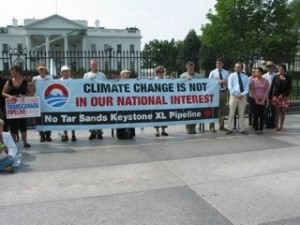Oil, Pipelines, and First Nations: When Ecological and Economic Interests Collide
Who is the Opposition?
A large conglomeration of environmentalists, First Nations and Aboriginal Communities, farmers unions and concerned citizens in general both in Canada and the United States have risen in protest to these plans, allowing none of the economic benefits to wane their concerns over the environment and their communities’ health.
Weyler told me that in Canada the “environmental groups are following the lead of the First Nations and indigenous groups.” The Tsleil-Waututh Nation on Burrard Inlet – the ‘People of the Inlet’ – and their Salish relatives, the Squamish and the Musqueam, are the “primary groups impacted by the Kinder Morgan pipeline.” The latter of the three has already signed the ‘Fraser River Declaration,’ which contains signatures from 61 different First Nations, all opposing any development of the Tar Sands on their traditional territories; the “Tsleil-Waututh and Squamish are consulting their own people on how to respond.” The overall movement, he told me, is being led by both the Yinka-Dene and Coastal First Nations Alliances.
Among the leading environmental groups, he shared, are Wilderness Committee, Tanker Free BC, Greenpeace, West Coast Environmental Law, EcoJustice, and Council of Canadians.
In the US, the Lakota nations and 350.org have been responsible for much of the oppositions’ organization, including the protests in Washington D.C.
All of these groups have come together to rally, protest and demonstrate in any way possible the very simple message that “[they] aren’t looking for half-measures [and that they] intend to stop these pipelines and the oil tankers on [their] coast.”
Weyler told me that if need be, people here and across the border are willing to be arrested “to protect their communities, land, water, and coastlines,” and assured me that “there will be people blockading oil tankers if nothing else works.”
[pullquote]110,000 litres (70 barrels) of crude oil spilled from a storage tank at the Sumas Mountain facility[/pullquote]Economic Prosperity in Perspective
Hobeshield assured me that Kinder Morgan’s “safety record speaks for itself,” boasting over 60 years as a leader in energy transportation and a sophisticated safety approach.
“The Company uses a multi-layered approach to pipeline safety that includes comprehensive damage prevention, pipeline integrity management and emergency response programs,” she told me.
Moreover, she ensured that “Kinder Morgan has effective spill response established through its own preparedness, and through its coordination with other emergency response agencies in the area – and in particular with its contracted responder, the Western Canada Marine Response Corporation.” She also suggested that combined with “the Government’s additional commitment and funding to marine safety,” they would be able to maintain these areas safe.
In the case of a spill on land, she said, “Kinder Morgan would take the responsibility for responding and clean-up,” holding responsible the “party found liable who would then be required to pay for damages.” If it happened on water, a similar liability-clause would be in place, and “the carrier of the product would be responsible for clean-up.”
In regards to the spill earlier this year in January in Abbotsford, B.C., where 110,000 litres (70 barrels) of crude oil spilled from a storage tank at the Sumas Mountain facility, Hobeshield assured me that the spill “was fully contained on [their] property.” She also declared that “the containment worked exactly as designed and all of the oil was recovered on the same day as the release,” avoiding therefore any injuries or threat to the public, and that precautions have been taken to avoid future similar scenarios. These include “an enhanced early notification system that will send automated calls should there be need, odour and air quality monitoring, as well as enhanced early detection” through the use of in-line inspection tools such as “smart pigs,” among others, that monitor the inside of the pipelines and report irregularities.
She also mentioned that “for almost 60 years, the 1150 km existing Trans Mountain Pipeline system has been operating safely…” However, oil products only began running through the pipeline after 2005, when Kinder Morgan bought Terasen Gas Inc.
In fact, since 2005 multiple red flags have been raised in regards to their safety record.
Reports by multiple publications cite a bad record, including a 2012 report by Sightline’s Eric de Place which notes that over the years, accidents in North America from Kinder Morgan oil and gas pipelines have resulted in “deaths, felonies and environmental disasters.”
There is tangible proof too.
The Thunderbird, the publication at the Graduate School of Journalism at the University of B.C, reports that after a pipe was accidentally struck by a worker in Burnaby B.C. in 2007, an investigation led by the Transportation Safety Board of Canada found about 1500 barrels of oil had been “released…into the surrounding neighbourhood;” it was the same year that the company “began to ship tar sands bitumen through Burrard Inlet on crude oil tankers,” said Weyler. On May 2009, “a storage tank at Kinder Morgan’s Westridge Terminal in Burnaby leaked more than 1900 barrels of crude,” reports The Thunderbird. And again on April 2011, the pipeline leaked around 70 barrels near Chip Lake, Alberta. The latest incident in Canada is the Abbotsford one. Multiple reports of pipeline leakages and other accidents across the border are also very well documented in various publications both mainstream and alternative.
Thus, for Weyler and the members of the opposition, a spill is more a matter of ‘when’ than ‘if’, and that is simply too jeopardizing.































Share the post "Oil, Pipelines, and First Nations: When Ecological and Economic Interests Collide"